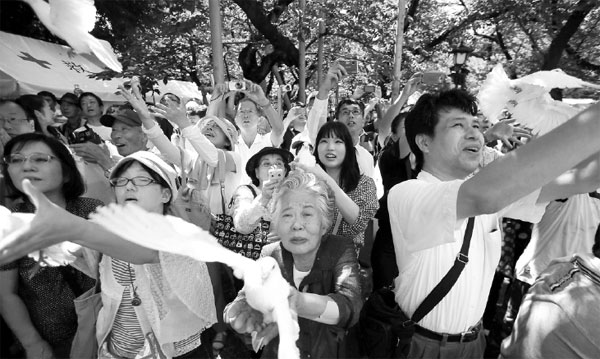69 years on, mixed feelings about war
For most Japanese, Aug 15 continues to be a day of notoriety and rebirth
Sixty-nine years after the fact, sentiment among Japanese people about Japan's unconditional surrender to the Allies at the end of World War II is still mixed.
While some reflect on the lessons of the war, historical revisionists led by Shinzo Abe's administration are bucking the trend.
|
People release doves in Tokyo on Friday, the 69th anniversary of Japan's surrender in World War II. Toruhanai / Reuters |
As people marked the 69th anniversary of Victory over Japan Day on Friday, it was time to consider the historic meaning of Aug 15 and to correct the lies.
For most Japanese, Aug 15 is a day of both infamy and rebirth, as it on one hand marks the defeat of Japan, while on the other marks the rebirth of Japan into a democracy.
But for Japanese veteran soldier Nobuo Okimatsu, rebirth is the more important of these, as he was literally saved that day by the surrender of his country.
Sixty-nine years ago, the then-20-year-old Okimatsu was a kamikaze pilot during Japan's war of aggression against China and other Asian countries. After training for three months, he, along with other soldiers, was given the mission of carrying out a suicide crash into an Allied ship.
Their mission was accidentally delayed on Aug 15, 1945, when the airport that their flight was scheduled to take off from was bombed.
That noon, Japanese Emperor Hirohito declared the acceptance of the provisions of the Potsdam Proclamation, and Japan's unconditional surrender.
After the war ended, Okimatsu joined the 815 Japan-China Friendship Association, an anti-war organization founded by a group of Japanese veterans who had taken part in the aggression.
Okimatsu now is the representative director of the association. The 89-year-old still participates in speeches and lectures, telling more Japanese of his bitter war memories and conveying his reflections.
To Okimatsu and other members of his organization, Abe's visiting the Yasukuni Shrine, where WWII Class A war criminals are honored, and moves to lift the ban on exercising the right of collective self-defense are counterproductive.
Hiroshi Akiyama was born in 1962, 17 years after Japan's surrender. V-J Day 69 years ago to him is closely connected to his memories of his grandfather, who was a soldier during Japan's war of aggression against China.
"My grandparents never talked about his past in the war,"said Akiyama, saying that once, when a television broadcast a memorial service to the war dead, his grandfather quickly switched it off.
"I think it is a sentiment of aversion,"said Akiyama. "He did not want to be reminded of the memories of war. It perhaps was a permanent trauma to people like him."
But many of Japan's younger generation seem to have been desensitized to the war and its lessons.
Sato, a college student, said he supports Abe's decision to lift the ban on exercising the right of collective self-defense. "Japan could help those nations that could not save themselves. From this point of view, I think the lifting of the ban is good,"he said.
That Emperor Hirohito was spared from trial as a war criminal has made Japan "a society bearing no responsibility", said Nobuyoshi Takashima, trying to explain Japanese youths' distorted understanding of history.
The professor at the University of the Ryukyus added that Japan's education also does not touch on the topic of Japan's waging of the war.
Japan has never called Aug 15 the day of defeat or the day of unconditional surrender. Instead, it calls it "the day when the war ended"to obscure its crimes and the lessons from them.
(China Daily 08/16/2014 page11)















